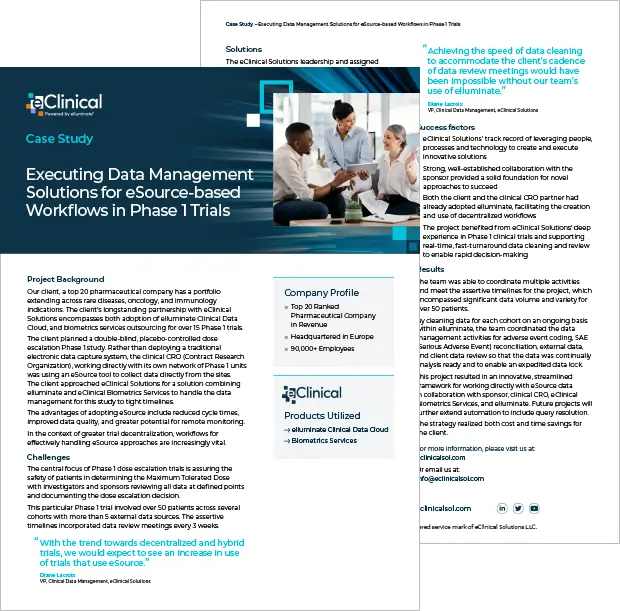
3 Key Drivers for eSource Adoption
According to the FDA (Food and Drug Administration), eSource (electronic source data) are “data initially recorded in electronic format” including “information in original records and certified copies of original records of clinical findings, observations, or other activities captured prior to or during a clinical investigation used for reconstructing and evaluating the investigation.”
While eSource technologies and electronic data capture (EDC) systems are closely interconnected, there are important distinctions between them. eSource tools are designed to capture and manage the above source data solely electronically, either by capturing it at the point of care, or through patients’ self-reporting. On the other hand, EDC systems, which are well established within the clinical trial framework, are designed to capture and manage data that is typically transcribed from source documents into an electronic case report form (eCRF). In practice, depending on the data collection approach of the clinical sites and the nature of the trial, eSource technologies may either complement traditional Electronic Data Capture systems, or be used as a primary means of data collection.
While there has been significant interest in eSource for many years, adoption has been challenging for reasons including risk aversion, change management, and lack of system interoperability. (“eSource Solutions- TransCelerate“) However, with the ongoing trajectory towards digitization catalyzed by the pandemic, the use of eSource may now be set to rise. Below are three key drivers that are on course to shape eSource adoption.
Drive for real-time access to data
In today’s speed-driven trials, modern clinical teams increasingly expect real-time, or near real-time data access to detect any issues or trends that may impact the trial outcome and to achieve informed decision-making. Timely data access is also a vital part of delivering complex trial designs which require ongoing monitoring and planned adaptations.
Use of eSource helps to streamline access to study data in real time, allowing for fast, informed decisions to be made without any delays in entering and processing data.
Rise of decentralized clinical trials (DCTs)
Decentralized clinical trials and hybrid trial models involve the remote collection of real-world data from patients in their homes, and the use of wearable technology and other digital tools. Adoption of these models is accelerating in the wake of the pandemic, and in response to a deeper focus on patient-centricity and diversity.
Since eSource approaches support remote patient data collection and monitoring, they form an integral part of DCT technology enablement.
Ongoing need for efficiency and cycle time acceleration
Achieving greater efficiency and accelerating cycle times are perennial industry priorities and were highlighted as key areas of focus in the eClinical Solutions’ Industry Outlook 2023. Adoption of eSource offers efficiency benefits by removing duplication of efforts for data entry and verification. By reducing the time required to collect and verify data, we can positively impact cycle times.
Adoption of eSource requires the right combination of expertise, technology know-how and appropriate data systems to execute successfully. Recently, as part of a longstanding partnership, we supported our client, a top 20 pharmaceutical company with a fast-paced Phase 1 trial deploying eSource technologies.
The ingenious and collaborative solution combined both elluminate® and Biometrics Services. Data from the eSource capture tool and external data sources were ingested into elluminate and cleaned by the data management team on an ongoing basis to inform a cadence of data review meetings. Through proactive project management, the team were able to coordinate multiple activities to meet the assertive timelines for the project, which encompassed significant data volume and variety for over 50 patients.
As the clinical development landscape continues to evolve, it’s likely that eSource will play an increasingly key role in the operational toolkit.
To learn more about how we helped achieve success for this complex workflow and streamline delivery for the client’s Phase 1 portfolio, click below to download the case study.

Executing Data Management Solutions for eSource-based Workflows in Phase 1 Trials
Author

Liz Cole has over 25 years’ experience in commercial roles within the biopharmaceutical sector with a particular focus on clinical data transformation, innovative trials, and advanced analytics. At eClinical Solutions, Liz is responsible for Biometrics Services’ marketing strategy, planning, product messaging, and content.
By submitting, you agree to the processing of your personal data by eClinical Solutions as described in our Privacy Policy.







